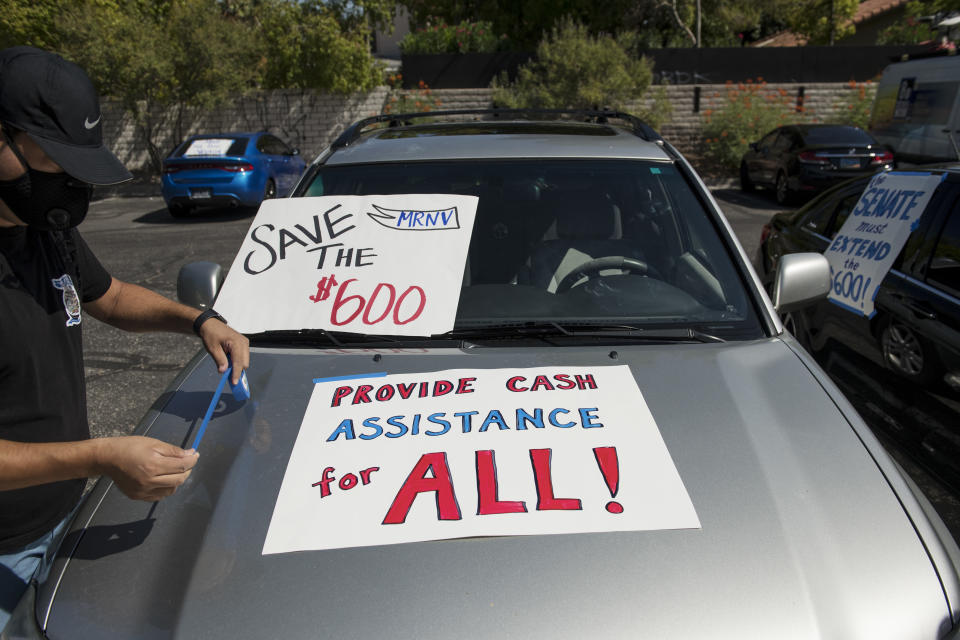Coronavirus stimulus: Loss of extra $600 unemployment benefits leads to 44% drop in spending
The expiration of the extra unemployment benefits not only has left more than 28 million jobless Americans with reduced income, but it’s also likely hurting a key factor in the economic recovery.
Without the additional $600 per week under the CARES Act — which expired at the end of July — local consumer spending will drop by an estimated 44%, according to a new paper from the National Bureau of Economic Research that examined how the cut in benefits will affect spending in 18 counties in Illinois.
Similar rates could potentially be seen across the country, according to one of the report’s authors, and that decline could hamper a rebound in the economy, which is largely dependent on consumer spending.
“One person’s spending is another person's income,” Julia Lane, NYU Professor and co-author of the report, told Yahoo Money. “When one group stops spending, then there's a knock-on effect. It's like a ripple in a pond.”

‘A large portion of economic activity’
Even as the nation’s gross domestic product shrank by 32.9% in the second quarter, personal income grew by 7.3%, according to data by the Bureau of Economic Analysis (BEA).
Read more: Here’s what you need to know about unemployment benefits eligibility
This was largely driven by stimulus checks and the extra $600 in benefits, now expired with a future that remains unclear. So far, Congress has failed to reach a deal on the next coronavirus relief package — including extending extra jobless benefits — while President Donald Trump’s recent action on unemployment could take weeks to implement.
That means out-of-work Americans have experienced a drop in benefits ranging from 52% to 72%, according to a previous analysis by Evercore ISI. Similarly, jobless workers in Illinois saw their average weekly benefit plunge from $812 to $257, according to the NBER paper.

“Consumer spending is a large portion of economic activity and that’s the main stimulus that has been happening,” Lane said. “44% is a very big hit to worry about.”
Even if the unemployment supplement is restored at a smaller amount, there would still be a significant hit on spending. If it’s reduced to $400, spending will take a 12% hit. If the benefit goes down to $200 extra per week, spending will decline by 28%, the paper found.
‘Even that $257 is going to run out’
Another potential hit to consumer spending is the eventual exhaustion of regular unemployment benefits for Americans who remain jobless as the pandemic wears on.
Around 4.5 million unemployed Americans may not be able to find a job for more than six months, while nearly 2 million will need more than a year to get a job again, a separate paper from NBER found.

“There's going to be a benefits exhaustion,” Lane said. “As people are on the unemployment rolls for longer and longer, what you really need to worry about is even that $257 is going to run out.”
States generally offer 26 weeks of unemployment benefits, plus an additional 13 weeks of federal Pandemic Emergency Unemployment Compensation (PEUC) provided under the CARES Act. But those weeks are quickly passing by.
“We've been four months into the pandemic,” Lane said. “A lot of those base unemployment benefits are going to start expiring.”
Denitsa is a writer for Yahoo Finance and Cashay, a new personal finance website. Follow her on Twitter @denitsa_tsekova.
Read more:
Analysis: 1 in 3 jobless Americans could be left out of Trump's action on unemployment
Even as GDP tanked, personal income grew thanks to government support
Read more personal finance information, news, and tips on Cashay
Follow Yahoo Finance on Twitter, Facebook, Instagram, Flipboard, SmartNews, LinkedIn, YouTube, and Reddit.

 money
money 
